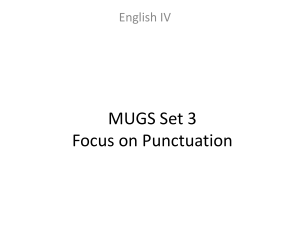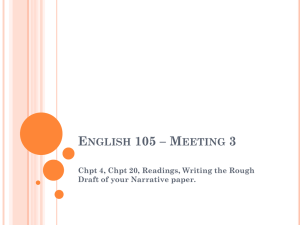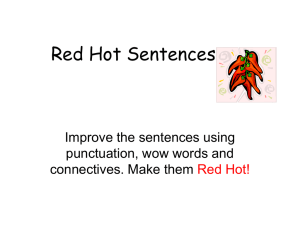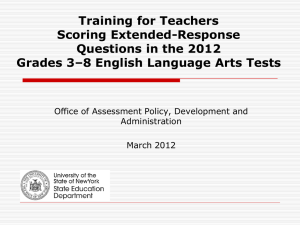Grammar Practice
advertisement
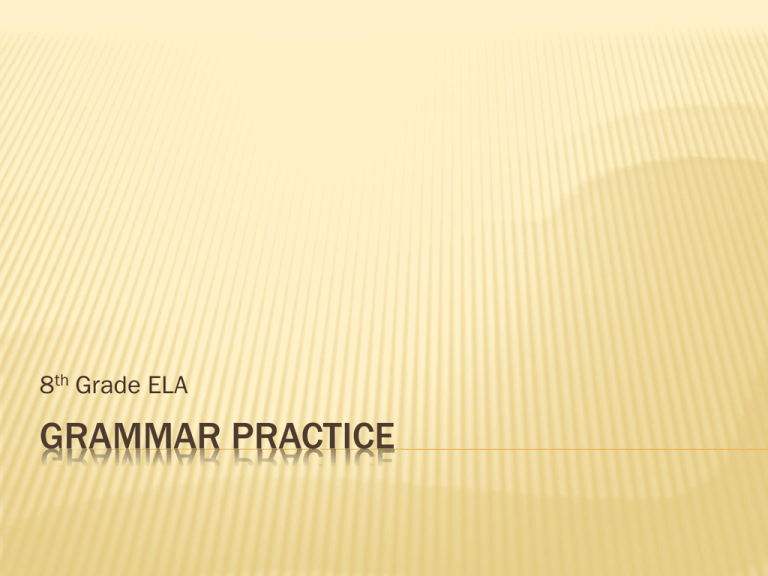
8th Grade ELA GRAMMAR PRACTICE David was known for belching; and telling inappropriate jokes in public. A. Capitalization B. Punctuation C. Spelling D. Grammar B: The semicolon is incorrect punctuation here. With the coordinating conjunction "and," no punctuation is needed between the two gerunds. A comma is permissible to indicate David did not necessarily do both things simultaneously; however, semicolons are for separating two independent clauses, or separating dependent clauses/phrases containing internal commas. Nurses plays a vital role in the healthcare profession. A. Capitalization B. Punctuation C. Spelling D. Grammar D: The singular form of the verb ("plays") disagrees with the plural noun subject ("Nurses"), representing incorrect grammar. After having his tonsels removed, the child was listless for a few days. A. Capitalization B. Punctuation C. Spelling D. Grammar C: "Tonsels" is an incorrect spelling of the word "tonsils." The park was serine at twilight. A. Capitalization B. Punctuation C. Spelling D. Grammar C: "Serine" is an incorrect spelling of the adjective "serene," meaning peaceful (indicated by sentence context), confusing it with the noun serine, meaning the amino acid. The bachalor never married. Most people thought it was because of misogyny. A. Capitalization B. Punctuation C. Spelling D. Grammar C: "Bachalor" is incorrect spelling of "bachelor." The professor was humiliated when his students reported him to the Dean for verbal abuse. A. Capitalization B. Punctuation C. Spelling D. Grammar A: The noun "dean" is not a name/proper noun, so the capitalization is incorrect. The con artist hoodwinked the old lady when he sold her fradulent insurance. A. Capitalization B. Punctuation C. Spelling D. Grammar C: "Fradulent" is incorrect spelling of the adjective "fraudulent." The movie star was accused of a misdemeanor, when she stole $15 worth of merchandise from the store. A. Capitalization B. Punctuation C. Spelling D. Grammar B: The comma before the adverbial clause ("when…") is incorrect punctuation; it should not be there. The congregation sang a comtemporary hymn. A. Capitalization B. Punctuation C. Spelling D. Grammar C: "Comtemporary" is an incorrect spelling of "contemporary." The defendint exhibited a peevish appearance. A. Capitalization B. Punctuation C. Spelling D. Grammar C: "Defendint" is an incorrect spelling of the word "defendant." The band director was scheduled to play the piccolo on tuesday. A. Capitalization B. Punctuation C. Spelling D. Grammar A: The lower-case initial "t" in "Tuesday" is incorrect capitalization: names/proper nouns are capitalized. The renter was remiss; about the rent. A. Capitalization B. Punctuation C. Spelling D. Grammar B: The semicolon here is incorrect punctuation. The only punctuation mark this sentence needs is its final period. The old man was know for his sapient knowledge. A. Capitalization B. Punctuation C. Spelling D. Grammar D: The correct past-perfect form here is "was known." "Was know" is incorrect grammar. For the Thanksgiving reunion, relatives were sitting in the dining room, on the porch, and in the carport. A. Thanksgiving, reunion B. were, sitting C. porch and D. No error D: No error. There is a comma after the initial modifying prepositional phrase and after the first and second modifying prepositional phrases in the series of three. No comma belongs between an adjective and the noun it modifies (A), or between an auxiliary verb and verb (B). Omitting the second comma setting off the first modifying prepositional phrase (C) is wrong Lydia seems to be a kind, considerate girl. A. seems, to B. considerate, girl C. kind considerate D. No error D: No error. A comma belongs between two consecutive adjectives modifying the same noun. A comma between verb and object (A) is incorrect. So is one between an adjective and the noun it modifies (B). Omitting a comma between two consecutive adjective (C) is incorrect. My cousin has moved to 56 Central Street Narragansett, Rhode Island 02882. A. has moved, B. Central Street, C. 56, Central D. No error B: There should be a comma between the street address and the city when stating a full address in sentence form (as well as between the city and state, as there is here). There should not be a comma between the verb and prepositional phrase (A), or between street number and street name (C). The badger, a shy animal sometimes makes friends with a coyote. A. sometimes, makes B. friends, with C. a shy animal, D. No error C: A modifying phrase between subject and predicate should be set off by commas on both sides. Putting a comma between adverb and verb (A) or between object and preposition (B) is incorrect. "Silent Night" was written by two men from the village of Oberndorf Austria. A. men, from B. "Silent Night," C. Oberndorf, Austria D. No error C: There should always be a comma between a village and country, city and state, state and country, or country and continent. There should not be a comma between the noun and modifying preposition (A), or between the subject and verb (B). On November 19, 1929 Admiral Richard E. Byrd flew the Floyd Bennett to the base of the Queen Maud Mountains. A. base, of B. the, Queen C. 1929, C: When a date is used in a modifying prepositional phrase before the subject and verb, it should have a comma after it (before subject-verb). There should not be a comma between a noun and modifying preposition (A) or between an article and the noun it modifies (B). "The boy in the kayak," whispered Sue "is the new football captain." A. boy, in the B. new, football C. whispered Sue, D. No error C: When a non-quotation clause/phrase is inserted in the middle of a quotation, it should be set off by commas on both sides. There should not be a comma between a noun and its modifying prepositional phrase (A), or between an adjective and the noun phrase it modifies (B).
